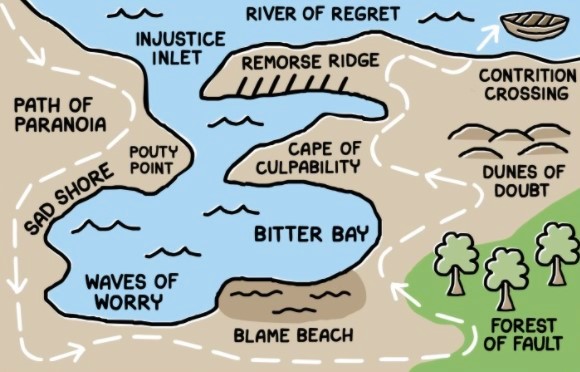2020 was an incredible year for travelling.
If you were a a virus, you got to travel everywhere. Here in Melbourne, we travelled extensively the 5 km radius around our homes. For many of us, that was of course the extent of our 2020 voyages. Unless you also count the guilt trips.
As a special needs parent, that is one trip I seem to take frequently, although I really try not to.
It usually comes about because I’ve made an error that affects people I care for. Settled into my own particular routines (and ruts) in life, I don’t always look outside the square, so to speak, for answers to what seem to be the same old, same old problems.
The latest guilt trip arose from a familiar theme: my daughter’s complaint that her leg hurts.
During lockdown, her daily program – like school and university for my boys – went online. In what already seems like an aeon ago, exercise was limited to an hour per day outside the house. Since Zoom sessions were limited to 40 minutes, after every session I would cajole, persuade and often straight-out bribe her to come outside with me and walk around the block to get some exercise. We made up our permitted hour with cumulative 10 minute walks.
Not everyone – in fact, probably few of us – can manage with or sustain aerobics or Zumba cheerfully delivered via YouTube.
However, this young woman does have a habit of complaining about imaginary ailments to get out of less-favoured activities. Who hasn’t done this at least once in their life?! My darling daughter, for all her special needs, has shown herself no different from anyone else in this regard. So when she began complaining again about her sore leg and I couldn’t identify any obvious cause, I sympathised but really only listened with only half an ear.
Sometimes what we might think are reasonable inferences will turn out to be wrong.
That’s just the way it is.
In my feeble defence, it didn’t help her case that the leg she complained about seemed to alternate from right to left from one walk to the next! And so we carried on throughout the lockdown months. Her complaints, if not consistent, were certainly persistent.
Finally, lockdown came to an end. Perhaps, I thought wearily, I should get her leg looked at, now that face-to-face physio visits were easier to obtain. I duly booked an appointment and the legs were checked out. No, there seemed to be nothing wrong. But had we checked her orthotics recently?
Maybe, said the physio, she should see the podiatrist. Thus, a day later, we were back at the clinic. And so began the guilt trip.
As it turned out, the orthotics were well beyond their use-by date and – to add insult to her injury – the shoes she wore daily were completely worn and providing no support whatsoever. Yes, the podiatrist told me, this would have been putting strain on her knees and she probably was having some degree of soreness or discomfort.
Oh boy – was I ever feeling like the bad mother by then.
I hadn’t even thought about the fact she wore the same shoes day in, day out. I hadn’t even considered that perhaps there was an issue with her orthotics. Because I hadn’t properly listened. No, I was totally in my own little frame of reference where this gorgeous young woman does fake it from time to time. Just, clearly, not over lockdown.
That was three months ago. I still feel a twinge of guilt when I think about it. When you have a special needs child, and you miss (or dismiss) something, the feeling of having failed your child is amplified significantly. Life is hard enough for them without a parent not taking seriously complaints of soreness or pain.
As my daughter gets older, I’m even more sensitive about this. If I miss something, someone who doesn’t know her as well as I might be even more likely to miss something.
So, worries about a future I can’t control pile onto guilt – which I can control.
I know I’ll make mistakes again. We all do, and much as we might try to be aware of our unconscious biases, the fact remains that they are, well, unconscious. I also know that I’ll feel guilty when this happens, bad that I failed my daughter.
But there are three things I can do.
- Firstly, commit to listening better, listening properly. Just because I can’t see a cause for something doesn’t mean it’s not happening.
- Secondly, admit that I’ve stuffed up, accept it and move on. Whipping myself with a mental lash is not constructive for me or my daughter.
- Thirdly – this is important for all of us with special needs children – remind myself that parenting someone with an intellectual disability and difficulties communicating can be difficult, whether they’re a child, teen or (like this young lady) adult.
Sometimes what we might think are reasonable inferences will turn out to be wrong. That’s just the way it is. It doesn’t mean that we’re bad parents, or that we’re failing our children. The important thing is: keep on trying and be a bit kind to yourself, too.
Until next time, Happy Wombatting!
Image: Copyright John Atkinson ‘Alliterative Guilt Trip’, available from wronghands1.com, 2019


